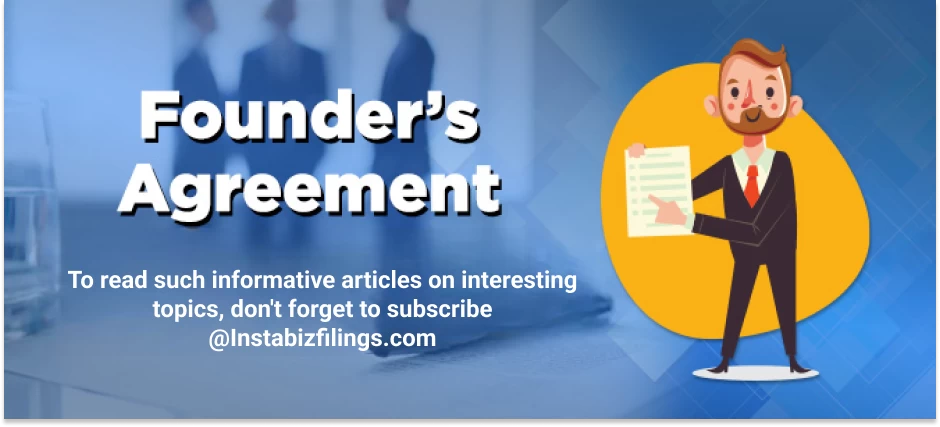
Founders Agreement
July 21, 2025 by Team Instabizfilings
What is a Founders Agreement?
A Founders Agreement is a basic agreement between the co-founders of a startup. It clearly defines each founder’s role, responsibilities, share in the company, and how decisions will be made. It helps set expectations early and avoids future conflicts by keeping everyone on the same page.
Why is a Founders Agreement Important?
Starting a new business is exciting, but it can also be risky especially when multiple founders are involved. Without a clear agreement, misunderstandings about roles, responsibilities, or ownership can lead to serious conflicts. A Founders Agreement helps prevent this by:
-
Highlighting clear roles and responsibilities
-
Clarifying equity division and percentage of ownership
-
Outlining vesting schedules
-
Describing decision-making and voting rights
-
Setting the terms of withdrawal or ouster of a co-founder
-
Protecting intellectual property (IP) rights
-
Conflict resolution management
Key Components of a Founders Agreement
-
Founders’ Roles and Responsibilities
- Describe the responsibilities that each of the founders will possess (e.g. CEO, CTO, CFO).
- Establish expectations to eliminate overlap or misunderstanding.
-
Equity Ownership and Vesting
- Entertain a distinction between the amount of equity held by the founders.
- The long-term commitment should be encouraged with the help of a vesting schedule (4 years, typically including a 1-year cliff).
-
Capital Contributions
- Record any cash, assets, or services that each founder is contributing.
-
Intellectual Property (IP) Assignment
- Ensure that all intellectual property developed by founders for the startup is owned by the company.
-
Decision-Making Process
- Decision-making methods should be defined: unanimous, majority, or by positions.
-
Founder Exit or Removal
- Outline the terms in case one of the founders quits or is kicked out.
- Put in buyback provisions and value systems.
-
Confidentiality and Non-Compete
- Add clauses to safeguard the confidential data of the startup.
-
Dispute Resolution
- Settle how disputes shall be addressed (e.g. mediation, arbitration, courts).
-
Dissolution of the Startup
- Explain what happens in terms of winding up the business and division of assets in case of the failure of the startup.
When Should You Create a Founders Agreement?
In theory, a Founders Agreement is signed before any actual work being done or as early as possible during the startup process. Delaying might cause misunderstandings or problems, particularly when money or intellectual property gets into the mix.
Do You Need a Lawyer for a Founders Agreement?
Templates are available on the internet, although it is strongly advised that you hire a startup lawyer to draw or revise the agreement. Each startup is different, and an experienced person in law can help you get a legal agreement that is enforceable and suits your circumstances.
Conclusion
A Founders Agreement is an important document that should be drawn up to provide a solid foundation to your startup. It reduces risks, enhances communication among founders and makes your company more credible in the eyes of investors. Consider it as more than a legal formality, consider it a strategic device to secure the future of your startup.
Disclaimer
The information provided in this blog is purely for general informational purposes only. While every effort has been made to ensure the accuracy, reliability and completeness of the content presented, we make no representations or warranties of any kind, express or implied, for the same.
We expressly disclaim any and all liability for any loss, damage or injury arising from or in connection with the use of or reliance on this information. This includes, but is not limited to, any direct, indirect, incidental, consequential or punitive damage.
Further, we reserve the right to make changes to the content at any time without prior notice. For specific advice tailored to your situation, we request you to get in touch with us.

Need more details? We can help! Talk to our experts now!
Start Your Business Registration – Talk to Our Experts Now!

Still Confused?
Talk to experts? Fill in the information and we will reach out in 24 Working Hours.

